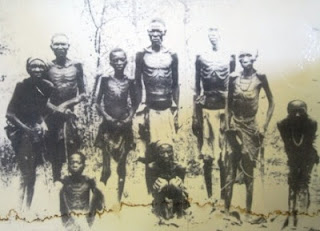I will post photos soon to complement this narrative...but I wanted to report on a recent trip to Luderitz. It is an interesting place; it is extremely remote - unbelievably so! It takes over 10 hours to travel there from the capitol of Namibia, Windhoek. See the map below:
Luderitz was founded as a port city, and grew in importance when diamonds were discovered nearby. The architecture, at least in town, is very German/European in style. It is also well known for the dolphins, seals and penguins that inhabit its coastal waters.
Kolmanskop, about 5 miles outside of Luderitz, is an actual ghost town! It was founded to feed the diamond industry, and was abandoned in 1950 when more and better diamonds were disovered in Oranjemund, also in Namibia. Today, the ghost town is losing in the battle against nature - sand dunes have literally taken over the formerly grand structures.
Both Luderitz and Kolmanskop are extremely remote and rugged. A local told me that only the most rugged Namibians can survive in Luderitz. There are stores there, including 2 grocery stores, but it is difficult to get supplies, and they are imported and thus quite expensive. Unemployment is also high.
Perhaps it is due to the holidays, where many Namibians head north to their home villages, or stick close to home, but both towns were very ghostly and quiet. For me, as a German American, I found Luderitz ghostly for another reason. The German architecture is beautiful, yes, but it is also an ominous reminder of a dark past of the German occupation of Namibia. The architecture looks grossly out of place. The remnants of German control can be felt in many places in Namibia. Just this morning, I attended a church service conducted completely in the German language. (There were 2 black Namibians there - the rest were white Germans or Namibians.)
On another note, I feel a noticeable shift in my perception of time. In Sarah Ban Breathnach's book, Simple Abundance, she warns against addiction of all kinds. Often our addictions seem innocent. Living in Namibia and experiencing time in a new way has given me insight into my own addictions. In the U.S., I was extremely addicted to overscheduling, technology and the need to always be in touch and to communicate. By necessity, that has changed here. We have been taught from the beginning to accept and embrace ambiguity and flexibility. It is not an easy adjustment, but it is teaching me a lot. Recently, I spent a few days not evening knowing what time it was! It felt like a completely different way to live, simply going with the flow of the day and the contours that surface. Neither way is better or worse, simply different. I may have been "more efficient" at home - but perhaps here I am coming closer to unearthing the things that really matter to me, and catching glimpses of how I can best be of service. I think this is part of all of our journeys; thank you for letting me share mine.

















































